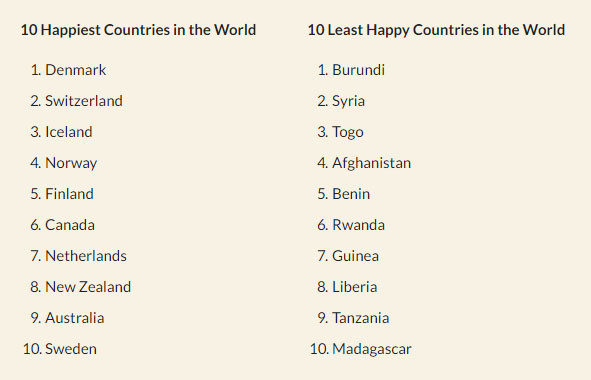Generation Fragile: The happiness agenda is making us miserable

The newest update of the World Happiness Report is was released yesterday (16 March) amid a three-day conference held at the Bank of Italy in Rome. These reports, published since 2012, review and rank happiness levels globally, but also promote the "science" of happiness and well-being as a viable guide for the behaviour of individuals and governments worldwide. While a seemingly laudable outlook, the unintended consequences of happiness promotion and the increased focus on people's internal emotional lives are becoming increasingly clear.
World Happiness Reports are just one of many representations of the increased focus on "positive" emotions in recent years. There are now a number of specialist academic journals on happiness, university course offerings and graduate programmes in Positive Psychology. In the UK, "happiness classes" have been pioneered by top-ranking Wellington College and the UK Office for National Statistics has begun tracking well-being.
These developments are part of a broader "emotional turn" in social sciences, social movements, media, and public policy. While bookshops continue to stock the usual therapeutic bestsellers, prestigious Yale University has proclaimed an "emotion revolution", aiming to raise awareness of the "critical role emotions play in young people's learning, decision-making, academic achievement, and overall wellness".

The UK has seen introduction of various forms of emotional literacy education and evening classes for adults in emotional well-being. Last year's hit Pixar film Inside Out even gave emotions emotions.
The emphasis on positive emotions should not fool us that we're witnessing a simple celebration of the human condition's positive side. Scratch beneath the surface of yellow smiley faces and a far more dismal view of the human capacity for happiness and resilience emerges. For instance, it's common for happiness advocates to bemoan traditional emphases on discovering and ameliorating social problems in research and policy.
According to one of Positive Psychology's founders, Martin Seligman, the goal ought not be "just the alleviating of misery but the building of well-being". But the focus on removing barriers assumes that doing so would enable people to get on with things. Arguing that experts must also focus on facilitating well-being and happiness betrays a doubt that left to their own devices, people actually possess the mental faculties to do so.
Indeed, a key claim for happiness as "science" has involved situating it beyond grasp of the ordinary and uninitiated. Influential advocate and LSE economist Richard Layard has claimed: "Learning hard things takes an enormous amount of practise. [...] How can we expect people to learn to be happy without massive amounts of practice and repetition?"
Rising concern with emotion will likely produce the opposite effect: constructing emotionally fragile and vulnerable human subjects, constantly in need of therapeutic guidance and support
Happiness advocates often describe people as bumbling fools when it comes to managing emotional life. Indeed, this disorientation toward emotion is often situated at the heart of social problems. Inculcation of "correct" ways to feel, think and behave, it is claimed, will not only solve social and environmental problems, but also breed myriad additional benefits.
Promoting happiness is promoted as preventive against future illness and costly incapacity. The result will be resilient citizens, inoculated from emotional difficulties and a society more emotionally aware, peaceful and progressive.

However, critics have long warned rising concern with emotion will likely produce the opposite effect: constructing emotionally fragile and vulnerable human subjects, constantly in need of therapeutic guidance and support. When it comes to happiness, by encouraging the view that it is something difficult, requiring constant monitoring, cultivation and attention, existing ways of "getting on" are undermined. In this way, therapeutic expertise creates its own ever-growing demand.
Therapeutic expertise creates its own ever growing demand
Indeed, this seems to be the case. The scale of mental ill-health is steadily expanding, not shrinking. This is little surprising. Not only has wellness been redefined in increasingly elusive terms, but also diagnostic categories have expanded to encompass nearly every aspect of the human condition. Interestingly, graduates of emotional education now entering universities seem to see themselves as uniquely frail and in need of support.
University campuses are no longer spaces for free exchanges of ideas, but rather "safe spaces" for emotionally fragile young people, increasingly hostile to ideas that might be construed as threatening. Symbolic violence has been equated with physical violence and words imbued with capacity to damage those who hear them.
Diagnostic categories have expanded to encompass nearly every aspect of the human condition
Speakers are banned not for saying outright offensive things, but because they question received wisdom on which fragile identities are constructed. Demands have been made for "trigger warnings", curriculum modification to expunge it of anything emotionally troubling, and even dismissal of lecturers for enunciating forbidden words or ideas, regardless of context.
Most interesting about these recent controversies is the bewilderment surrounding their emergence. In a much shared article, Jonathan Haidt and George Lukianoff criticised hypersensitive university climates as a "Coddling of the American Mind". Searching for causes, they reflect on overprotective parents and partisan politics, but perhaps ironically, they fail to reflect upon themselves.
In books like The Happiness Hypothesis (2006) Jonathan Haidt advocates precisely the kind of emotional determinism that leads to the belief that emotional well-being is so fragile and at risk, forwarding the outlook that emotions are both difficult and determining factors in everything we do.
Jonathan Haidt and George Lukianoff criticised hypersensitive university climates as a 'Coddling of the American Mind' but perhaps ironically, they fail to reflect upon themselves
Nicholas Christakis, the academic shrieked at by students for failing to protect their "safe space" in a November viral video, elsewhere vigorously promotes that emotions and behaviours are contagious. For years, they and other members of the therapeutic professions have preached a gospel of emotional vulnerability. And yet they seem stupefied when the proverbial chickens have come home to roost.
The emotional turn promotes a fragile subject with diminished capacity to cope with the vicissitudes of life. It's important to recognise this isn't an inevitable outcome of engagement with the world. One of the reasons emotional rhetoric has become so powerful is its creation of a bubble of vulnerability and victimhood around arguments that critics pierce at great peril. But the meanings we give to a situation are also influenced by the way our culture encourages us to judge it.
When nearly every social problem is communicated through the language of threats to emotional wellbeing, we shouldn't be surprised when everything does become experienced as a threat and people become more fragile, not less.
Ashley Frawley is Senior Lecturer in Sociology and Social Policy at Swansea University. Her research explores the rising importance attributed to emotions and behaviour in contemporary constructions of social problems. She is the author of The Semiotics of Happiness: Rhetorical beginnings of a public problem published by Bloomsbury Academic in 2015 and is currently working on a new book exploring the rise of emotional language in public debate.
© Copyright IBTimes 2025. All rights reserved.






















